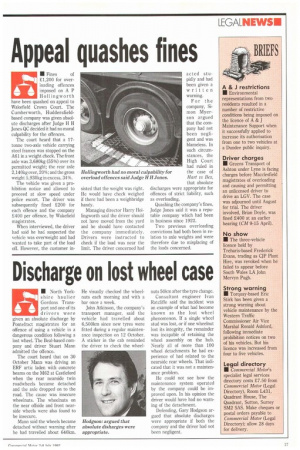Appeal quashes fines
Page 19

If you've noticed an error in this article please click here to report it so we can fix it.
MI Fines of £1,200 for overloading offences imposed on A P Hollingworth have been quashed on appeal to Wakefield Crown Court. The Cumberworth, Huddersfieldbased company was given absolute discharges after Judge H H Jones QC decided it had no moral culpability for the offences.
The court heard that a 17tonne two-axle vehicle carrying steel frames was stopped on the A61 in a weight check. The front axle was 3,680kg (55%) over its permitted weight; the rear axle 2,140kg over, 20%; and the gross weight 5,930kg in excess, 34%.
The vehicle was given a prohibition notice and allowed to proceed at slow speed under police escort. The driver was subsequently fined £200 for each offence and the company £400 per offence, by Wakefield magistrates.
When interviewed, the driver had said he had suspected the vehicle was overweight and had wanted to take part of the load off. However, the customer in sisted that the weight was right. He would have check weighed if there had been a weighbridge handy.
Managing director Harry Hollingworth said the driver should not have moved from the yard and he should have contacted the company immediately. Drivers were instructed to check if the load was near the limit. The driver concerned had acted stupidly and had been given a written warning.
For the company, Simon Myerson argued that the company had not been negligent and was blameless. In such circumstances, the High Court had ruled in the case of Hart vs Bex, that absolute discharges were appropriate for offences of strict liability, such as overloading.
Quashing the company's fines, Judge Jones said it was a reputable company which had been in business since 1922.
Two previous overloading convictions had both been in relation to axle weights and were therefore due to misplacing of the loads concerned.
















































































